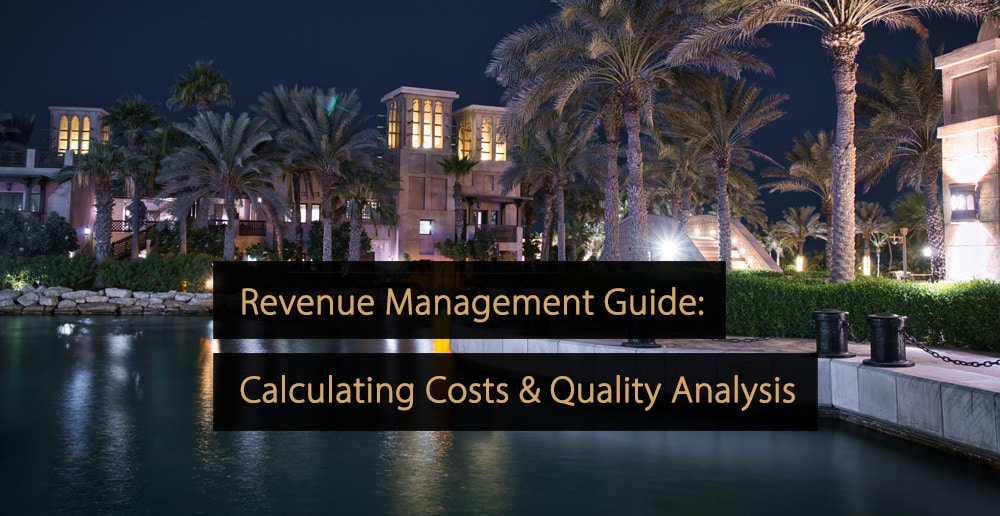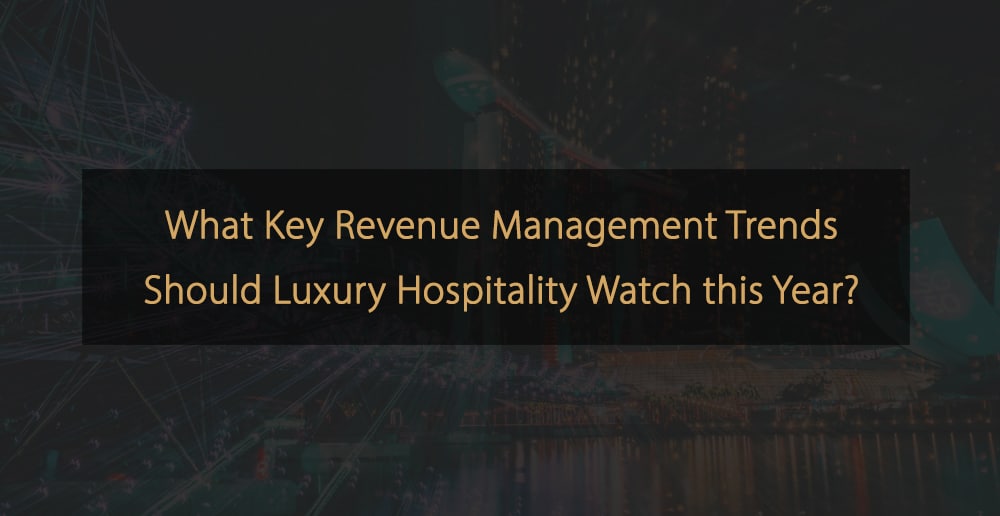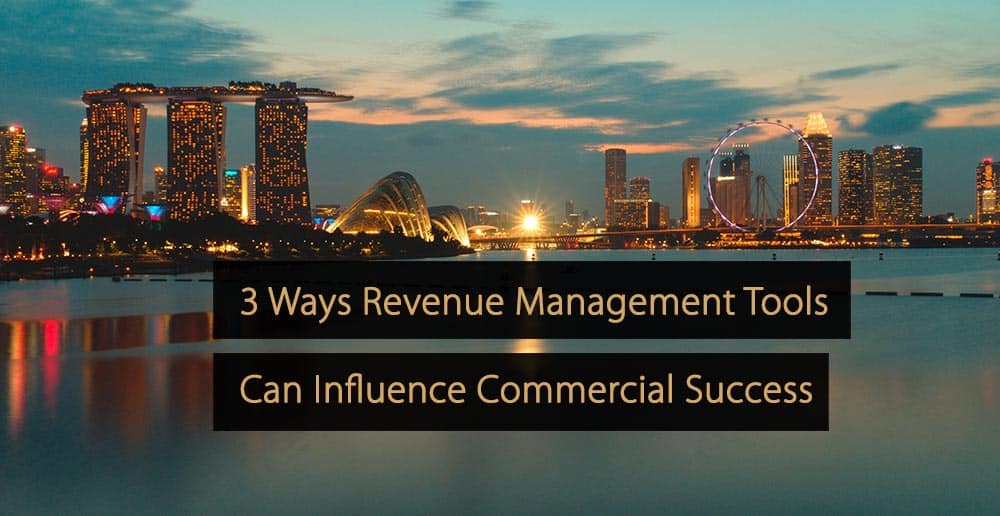Question for Our Revenue Management Expert Panel:
Is it realistic to focus on profitability over revenue? How should revenue management teams manage stakeholder expectations? Where might challenges arise? (Question by Diego Fernandez Perez De Ponga)
Industry Expert Panel
Our Industry Expert Panel exists out of professionals within the hospitality & travel Industry. They have comprehensive and detailed knowledge, experience in practice or management and are forward-thinking. They are answering questions about the state of the industry. They share their insights on topics like revenue management, marketing, operations, technology and discuss the latest trends.
Our Revenue Management Expert Panel
- Diego Fernández Pérez De Ponga – Director of Revenue Management, Palladium Hotel Group
- Tanya Hadwick – Group Revenue & Yield Leader, SunSwept Resorts
- Massimiliano Terzulli – Revenue Management Consultant, Franco Grasso Revenue Team
- Mariska van Heemskerk – Owner, Revenue Management Works
- Damiano Zennaro – Founder, DZ Consulting
- Fabian Bartnick – Founder, Infinito
- Heiko Rieder – Vice President Business Development, Hirmer Hospitality and Travel Charme Hotels
- Connor Vanderholm – CEO, Topline
- Krunal Shah – Director of Revenue Management, The Biltmore Mayfair, LXR Hotels & Resorts
- Pablo Torres – Director, TEDUKA
- Oleksii Kapichin – Revenue Management Professional
- Silvia Cantarella – Revenue Management Consultant, Revenue Acrobats
- Ask Our Panel a Question
- Join Our Expert Panel
“To start with, I think it’s key that revenue managers start to think in terms of profitability, not just income. This seems simple, but it needs a big change in many areas, like the way teams think or big changes in our main metrics, and we can’t forget the needed changes in current technology.
Organisational Culture: We need to encourage a culture that values efficiency and uses resources well, as much as making more money. This means teaching teams how their actions affect profitability. We need to stop just thinking about income and start thinking about profitability, in both the sales process and how our sales impact the profits in our hotel.
New Metrics: We should start using metrics like profit per available room (GOPPAR – Gross Operating Profit Per Available Room) and Net ADR, which is like the hotel’s ADR but without distribution costs.
Changes in Technology: Maybe our biggest problem is how systems handle taxes, fees, and marketing costs. Another point is deciding what we do with not-so-easy-to-apply sales costs, like technology costs, staff costs, or marketing efforts.”
“As all businesses have a primary mission for long-term profitability, it is necessary to look at profitability when making decisions. However, I don’t believe they are mutually exclusive and need a concentrated focus on both.
Balance is important between the two, as it’s about securing the revenue to generate the profit. Driving top-line revenue while not ensuring flow through to the bottom line, will ultimately lead to unhappy stakeholders. However, from a revenue management perspective, a lot of the time, except for distribution costs, etc., there is very little control over costs within the business.
When it comes to managing expectations, honesty is always the best policy. Make sure you have open conversations about any potential limitations and market conditions so everyone is on the same page.”
“It is realistic and necessary to focus on profitability in general, as opposed to room revenue only.
In the end, every hotelier is interested in generating a profit that represents a reward for their entrepreneurial efforts.
Unfortunately, in smaller, independent family-run facilities, there isn’t always an awareness of how to track and monitor data and how important it is to use certain tools to scientifically and methodically manage and monitor total costs and revenues.
It must be said that once you have acquired the right tools to monitor and track costs, and once you have taken all the measures to optimise costs, you must be aware that costs cannot be compressed too much, otherwise, the quality of the service offered could be compromised, and therefore the reputation and revenues in a vicious circle. So, the fastest and easiest way to improve profitability is to increase revenue, i.e., adopt all the best revenue management practices.
However, a good revenue manager cannot stop at RevPAR, they must have a holistic view of profitability by measuring TrevPAR (Total Revenue Per Available Room) and GOPPAR (Gross Operating Profit Per Available Room). The same thing also applies to those small, independent establishments that do not have a revenue manager and where the owner takes care of everything.”
“100% yes! In the end, it’s the bottom line result that counts, and by knowing the cost structures of your locations you can determine the best way to sell. For example, is there a tipping point with regard to occupancy? At what number of rooms sold do you need more housekeeping staff, more reception staff, etc.? How much capacity can your restaurant handle for breakfast to maintain service/quality but also how many guests are needed to at least break even on the breakfast buffet costs?
It is important to know such things so you make decisions regarding price vs. volume. By having commercial meetings with your teams, involving them in the forecast, and delivering operational forecasts, you can decide together on the best strategy and they can ensure proper scheduling and no under / overstaffing at certain points.”
“Profitable Revenue Management is not a trend anymore and ProPAR / POR is an emerging KPI. Profitability goes hand in hand with cost of distribution, channel strategy (direct vs indirect), and COPE %, something that the hotel industry has been looking at for some years. I strongly believe that Last Room Values and/or Hurdle Points in Revenue Management Systems will soon be ready to become NLVR – Net Last Room Value or Net Hurdle Point with some logical consequences.
When dealing with Profitable Revenue Management and focusing on changing the way we measure performance, I strongly recommend carefully evaluating expectations and duly inform all main stakeholders: a better ProPAR/POR does not mean a better RGI and volume from intermediated channels like OTA’s might be (heavily) impacted. By experience, it’s first a change in mindset rather than a simple change in how to measure performance, and as such, it needs to be carefully prepared.”
“Not realistic. The Revenue Manager should focus on revenue. However, we need to stop saying “manage revenue”; the Revenue Manager needs to also be in charge of generating revenues. The modern RM needs to be agile, proactive and strategic in nature instead of throwing every new item at them. RM is a niche, leave it to be a niche and own that niche.”
“Focusing on profitability over revenue is a realistic and often prudent strategy for hotel revenue management. While revenue is an important metric, profitability takes into account costs and, ultimately, determines a hotel’s financial success.
In that regard, Revenue management teams should educate stakeholders, including owners, investors, and management, about the importance of profitability as the ultimate goal. They need to understand that maximising revenue doesn’t always lead to higher profits, especially if it involves heavy discounting or unsustainable pricing and be aware of the strategy to achieve the aligned goals.
Metrics that provide a more comprehensive view of financial performance will support the monitoring and transparency for all stakeholders. One of the key challenges for revenue management to maintain cost efficiency is the understanding of the true net cost per reservation for each channel (i.e., commissions, internal operational cost, media spending, technology) as well as customer lifetime value. Further, it can become more challenging when stakeholders prioritise short-term revenue gains over long-term profitability. Revenue management teams may face pressure to fill rooms at any cost, which can negatively impact profitability.
It is therefore crucial to have a strategy in place which is dynamic enough to react to unexpected short-term demand shortfalls.”
“It’s absolutely realistic to focus on profitability over revenue. In revenue management it’s not about what rate you show, it’s what you capture. So too is it with profit vs revenue; it’s not what you make, it’s what you take to the bank. The challenge is that the revenue team does not have control over costs at a hotel. While they do not have the majority of responsibility for the profitability of the hotel, they often get the finger pointed at them when a hotel is not as profitable as the owner would like.”
“A hotel that’s always full isn’t necessarily always a profitable hotel. It is very realistic to focus on profitability, which then increases the bottom line. For this, the hotel revenue team needs to implement a lot of revenue management techniques and strategies. Once the implementation process is completed, all areas or segments need to complement each other to form a definitive strategy for the hotel. In this way, revenue managers will be able to manage the expectations of the stakeholders.
However, there are a few challenges. Some are controlled internally but some challenges are external and beyond our control. The main challenge is getting the best market segmentation mix in the business for each day of the year. Additionally, it’s a challenge to get the impact strategies in place and implement them for the property.”
“I believe it is the only way forward. Gone are the days when the only goal was to put “heads in beds”. Nowadays, we have to be conscious of the cost of getting that bed occupied today, and also of the ancillary revenue that this guest could generate.
So we are moving from Room Revenue Management to Total Revenue Management to Profitability Management, to know exactly the net marging each guest and customer leaves. To do so, the latest tech is needed to gather all data points throughout the customer journey and be able to calculate it accurately.
The only two things that still separate revenue managers from becoming profit managers are:
- For some, their mindset is still stuck in the past.
- For most, technology. In most cases, hotels lack the right tech stack that could facilitate the revenue manager to concentrate on profitability.
However, more and more revenue managers have a good enough tech stack that is connected and exchanges information across systems, therefore enabling them to review the profitability of each room sold per channel, each item sold at the restaurant, each drink delivered via room service, etc., via their financial Business Intelligence solution. Once that is done, the next step is to focus on new metrics: profitability per employee and worked hours will be a hot topic soon.”
“Before discussing profitability, we need to fix the basics, i.e., the revenue managers’ incentives and goals. Most revenue managers still have the RevPAR Index and budgeted Room Revenue as the goal and part of the bonus. Based on this setup, the revenue manager is focused on generating revenue (not even total, just room revenue) and beating the comp set in the revenue index.
We can not blame the revenue professionals for this since it’s the expectation set for their roles. It’s hard to expect revenue managers to opt for generating less revenue by utilising a more profitable distribution channel because the revenue goal is the priority, not profitability. Hoteliers can start by setting TrevPAR, and NetRevPAR goals for revenue managers and make the Rooms Department profit as part of the bonus.”
“Revenue and Profit management are no longer separate entities, and for this reason, they must coexist in the strategy. There is still an old school of thought that stops at the topline, and often the focus on occupancy and ADR prevails to the detriment of the bottom line. The role of the Revenue Manager must remain that of educating stakeholders by clearly highlighting topline revenue vs bottom line profit and the distribution cost, working closely and transversally with the finance department if necessary, to break down the data and present it in an understandable and coherent way.
Unfortunately, benchmark data is still widespread in the comparison of topline KPIs without considering distribution costs and more. Although a profitability benchmark exists, we are still far from moving our reasoning in this direction but starting from the education of all the people involved and the reading of the data from all aspects (top and bottom line) we will be able to move more and more towards Profit Management.”
Ask a Question & Join Our Expert Panel
Would you like a question to be answered by our Industry Expert Panel? Or would you like to join our community of experts and share your experience, insights, and knowledge with fellow industry professionals? Via the buttons below you can submit a question or submit a request to become part of our expert panel.
More Tips to Grow Your Business
Revfine.com is the leading knowledge platform for the hospitality and travel industry. Professionals use our insights, strategies, and actionable tips to get inspired, optimize revenue, innovate processes, and improve customer experience.Explore expert advice on management, marketing, revenue management, operations, software, and technology in our dedicated Hotel, Hospitality, and Travel & Tourism categories.



















Leave A Comment